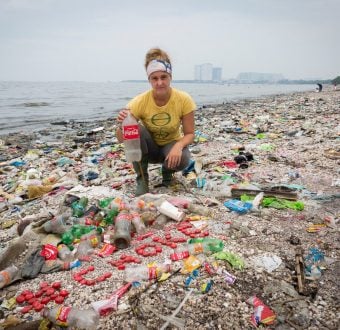“Although it’s a compromise, this bill represents a historic first step toward protecting the 100 million Americans living in the shadow of high-risk chemical plants,” said Rick Hind, legislative director of Greenpeace. Attempts by House Republicans to weaken the legislation were voted down. “The day after a terrorist attack at a chemical plant kills thousands of Americans, any suggestion that we should not require the use of safer chemicals at these plants will be considered totally crazy. Republicans should have been offering amendments to strengthen this modest legislation instead of trying to cripple it,” said Hind.
“Senator Lautenberg (D-NJ) first proposed this legislation in 1999. It’s time for the Senate to recognize the urgency of this issue and embrace common sense solutions that eliminate these risks once and for all,” said Hind.
Earlier this week, the Clorox Company announced plans to convert all of their U.S. facilities from ultra-hazardous chlorine gas to liquid bleach to “strengthen our operations and add another layer of security,” according to their CEO Don Knauss. Clorox also indicated that these changes “won’t affect the size of the company’s workforce.” Hind added, “by leading the way in eliminating the potential consequences of a catastrophic terrorist attack or accident, Clorox provided Congress with compelling new evidence to enact chemical plant security legislation.”
Since 9/11 more than 200 chemical facilities have converted to safer chemical processes, eliminating poison gas risks to more than 30 million Americans. Yet 300 other chemical plants together put 110 million Americans at risk.
On October 1st, the Department of Homeland Security and the Environmental Protection Agency for the first time testified in favor of this legislation. “For the first time since the September 11th attacks Congressional leaders and the administration are in agreement on legislation that will actually protect the millions of Americans that remain at risk from chemical plants that can be turned into weapons of mass destruction,” said Hind.
In addition, water utility groups and a blue-green coalition of more than 50 organizations are urging Congress to enact this legislation. They include: Association of Metropolitan Water Agencies, the United Auto Workers, Steelworkers, Teamsters, Fire Fighters, Sierra Club, Physicians for Social Responsibility, U.S. Public Interest Research Group, Environmental Defense Fund and Greenpeace.
The House passed bill (H.R. 2868) will:
– Conditionally require the highest risk plants to use safer chemical processes where feasible and cost-effective and requires the remaining high risk plants to “assess” safer chemical processes;
– Eliminate the current law’s exemption of thousands of chemical facilities, such as waste water and drinking water plants and port facilities;
– Involve plant employees in the development of security plans and provides protections for whistleblowers and limit back ground check abuses;
– Preserve state’s authority to establish stronger security standards;
– Provide funding for conversion of plants, including drinking water facilities and wastewater
facilities, and
– Allow citizen suits to enforce government implementation of the law.
Examples of the compromise include:
Limits the number of chemical facilities (approximately 107) subject to safer chemicals;
Allows chemical plants to appeal safer chemicals requirements;
Limits citizen enforcement suits to government agencies, and
Limits information to the public on which chemical facilities are regulated.
###
VVPR info: Contact: Jane Kochersperger, Media Officer, (202) 680-3798 cell; Rick Hind, Legislative Director (202) 319-2445; Mae Stevens, Policy Analyst, (314) 497-4993 cell

